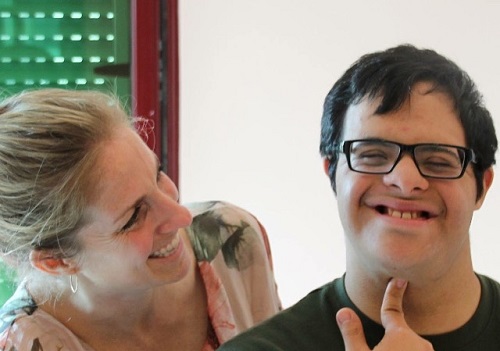Almost immediately after COVID-19 hit Canada in March 2020, Amy MacFarlane, Founder and CEO of Recreational Respite, realized she had a major problem. “All of our services shut down,” she says, remembering the chaos of those initial weeks. “Before the pandemic, we offered in-person one-on-one services and group programs in the community. We didn’t have anything virtual.”
Recreational Respite is a Canadian not-for-profit social enterprise that identifies barriers to participation and provides supports for those with disabilities or mental illness. The organization facilitates a variety of therapeutic recreational programming promoting inclusion, community participation, and social connectedness. But this programming was always conducted in-person.
“Like everyone else, we were moved into this new space quickly,” MacFarlane recalls of the frenzied pivot her team undertook to offer much needed programming to customers. “We quickly identified the interest and need,” she explains. “We developed an entire month of virtual programming in seven days. We built a virtual service calendar in April and gave them away for free.”
The response was immediate. “We were busy!” she says. “Our virtual calendar programs filled quickly with all ages and we started to gain attention in the community.” In April 2020, MacFarlane and her team organized 32 virtual programs each full with eight participants. By June, the program offerings doubled, and Recreational Respite was serving over 500 participants a month. “Other organizations inquired about ways to partner with us to deliver our virtual programs to their customers for a more diverse virtual landscape,” MacFarlane says.
Supporting people facing barriers
Employment and Social Development Canada estimates over six million Canadians, nearly one in five, has a disability. Recreational Respite works across Canada to ensure those living with disabilities continue to be active members of their communities. Clients include those with intellectual or physical disabilities, mental health concerns, language difficulties, PTSD, reintegration after military or first responder service, and other populations.
“Our goal is to support anyone who faces barriers to participation,” MacFarlane says. “These barriers have been socially constructed. The environment isn’t built for inclusive practices.”
MacFarlane’s team of recreational therapists deliver person-centred programming that cultivates life skills and self-care. “Everything we do is for the individual we serve,” she says. “We believe ‘nothing about us, without us,’ when we deliver program supports. And every time we deliver a service, revenues go back into group program development.”
Over a year has passed since those initial turbulent weeks and there are still challenges with offering a primarily virtual model. But pandemic restrictions are slowly loosening in some parts of the country which have allowed a return to one-to-one in-home services and small group interactions.
Unintended benefits
MacFarlane is aware of unintended benefits of being pushed into virtual service delivery including reaching rural communities – a program feature that wasn’t fully optimized before COVID-19. With this change, her mind is buzzing with future opportunities. “We are looking at ways to share our skillset and capacity,” she says. “We could create inclusive spaces virtually, could bring more people together. We could nurture the individual’s specific interest.”
MacFarlane also loves effective partnerships to better serve her clients. She is currently working with Jays Care Foundation to increase the reach of her programs. This exciting partnership matches a family from Challenger Baseball with a trained worker from Recreational Respite to provide in-home, reputable, quality aids to families experiencing barriers.
“We are always looking for ways to partner to maximize program impact, sustainability, and minimize costs.”
Like countless not-for-profits and social entrepreneurs, MacFarlane is still navigating the evolving pandemic. But despite the number of challenges, she remains optimistic for the future.
“Our hope over the next six to twelve months is to continue to build solid community partnerships to maximize support,” she says. “We want to share tools and strategies with others and build more cohesive opportunities for inclusion. We just want to produce positive outcomes.”
Benjamin Rempel is a writer and essayist specializing in public health and social justice. His work has been featured in The Toronto Star, National Observer, Our Canada, The Standard, among many other outlets.


